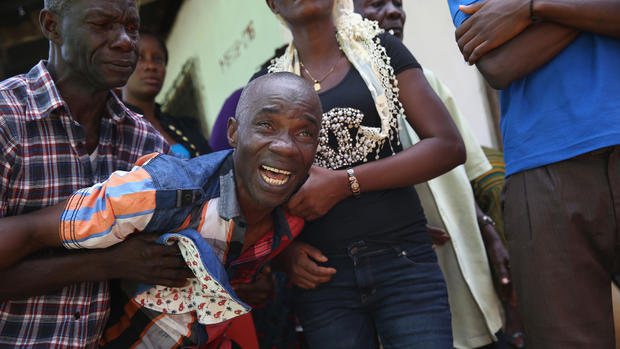A grassroots battle at the Ebola epicenter
MONROVIA, Liberia -- In the Liberian capital, CBS News' Debora Patta says it's clear that while awareness about Ebola is increasing, it's still not enough to stop the disease from spreading.
The latest statistics from the World Health Organization (WHO) suggest as many as 10,000 new cases per week could be the norm within a couple months if more isn't done to halt the virus.
Already the statistics on Ebola infections go up each week, and once again, the WHO is grim:
As of Wednesday morning, there were 8,914 confirmed cases of Ebola -- almost all of them in West Africa -- and that was sure to go over 9,000 by the end of the week. More than half of the cases resulted in death, with 4,447 fatalities as of Wednesday morning. The current rate of infection, according to the global health body, was about 1,000 new cases each week.
"For every case of Ebola, there is about two more people contaminated, we are trying to get that number down," a WHO official said Tuesday.
The organization warned the disease has spread to more geographic locations within the three affected West African countries -- Liberia, Guinea and Sierra Leone -- and the death rate from the virus had increased to 70 percent.
In Monrovia, Patta says community leaders are desperately trying to reverse the negative trend. The lack of awareness and urgency is slowly being replaced with focussed community action, particularly in places like the sprawling Monrovia slum of West Point.
Archie Gebussy is one local community leader who runs a campaign to catch infections early and prevent the disease from spreading.
"Basically in this house 5 people died last month," Gebussy told Patta at one home in West Point. "They are the family. It happened as a result of them not having the basic education, defending themselves as people. Now that they have had an education, they have experienced no more sickness. They are taking all of their preventing measures."
His team of over a 100 volunteers go door-to-door every day.
"We are offering a wellness message," he explained. "We are basically educating them on the danger of Ebola, how deadly it is, then we do active case finding, we try to identify all of the sick people."
Efforts like Gebussy's are crucial to halting the spread of Ebola, and there have been pockets of success in Monrovia, but Patta says the campaigns are not widespread enough, and clearly not reaching some rural areas.
Stopping the rate of infection from increasing will require a far bigger, more coordinated international response.
